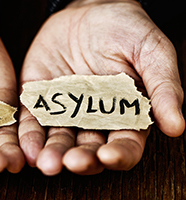Asylum support
Access to asylum support
The government website provides an overview and details of support available to asylum seekers in the UK, and Asylum helplines assist with information related to the asylum process and adapting to life in the UK.
More information on financial support — Immigration Act 1999
Asylum seekers are not entitled to claim public funds. However, asylum seekers who have launched their asylum claim may be able to get help with housing and financial support from the Home Office, section 95. An asylum seeker may therefore get housing and financial support until their asylum claim is finally determined by the Home Office or appeal courts.
Support for refused asylum seekers
A refused asylum seeker may get housing and financial support if they can show that there is a temporary barrier preventing them from leaving the UK. This support is usually provided to single people and it is often referred to as 'section 4 support' because it is provided under section 4 of the Immigration and Asylum Act 1999. Financial support is provided in the form of vouchers and cannot be applied for separately if the refused asylum seeker has alternative accommodation.
Support for asylum seekers and refused families
Families will continue to receive financial and housing support even though their claim has been unsuccessful, if there was a child under 18 in the household when the final decision was made. This support is often referred to as 'section 95 support' because it is provided under section 95 of the Immigration and Asylum Act 1999. Financial support to the family is provided via card or voucher payments and may be applied for separately if the asylum seeker has alternative accommodation.
Access to housing
Asylum seekers are given somewhere to live; this could be in a flat, house, hostel or bed and breakfast. He/she cannot choose where to live. Accommodation providers are obliged to ensure that 'internal and external aspects of the accommodation are clean prior to an asylum seeker taking up occupancy'. In addition, they are required to provide a welcome pack with essential information and contact details of the housing officers.
Support for refugee children
As stated earlier in the mental health section, asylum seekers and refugees' children are very vulnerable for a number of reasons such as witnessing parents or siblings being tortured or killed, being separated from one or both parents, and loss of siblings. These events have an impact on the development and psychological well-being of the children. In addition, these can diminish the children’s ability to learn or integrate in the school community. Local Education Authorities are encouraged to develop local policies and procedures to provide for the education of asylum-seeker and refugee children. Please contact your Local Education Authority for further details.
Support for gay and lesbian asylum seekers and refugees
Gay and lesbian asylum seekers and refugees often face very intrusive sexual questions. It is therefore very important that health care professionals facilitate the access, and give the most appropriate support and advice. A number of UK-based charities and organisations offer support and advice to gay, lesbian, bisexual and transgender (LGBT) asylum seekers and refugees.
Refugee Action in Liverpool
Refugee Action in Liverpool provide support and advice for asylum seekers and refugees.
Housing resources
CDS Housing Association (for Floating Support)
Healthy Homes Advocates
Shelter
Education resources
Children must attend school if they are aged 5 to17. All state schools are free and your children may be able to get free school meals.
Schools for children
School resources
National Museums Liverpool
Blackburne House Group
UK NARIC
Reache Northwest
When can housing and financial support be provided by local authorities to refused families?
There are provisions that require local authorities to provide some people with NRPF with housing and/or financial support in order to prevent homelessness or destitution. Such assistance can be provided to:
- Families, where there is a child in need (for example, because the child is homeless or the parent cannot afford to meet the family's basic living needs)
- Young people who were formerly looked after by a local authority, for example, because they were an unaccompanied asylum seeking child (UASC), or other separated migrant child
- Adults requiring care and support due to a disability, illness or mental health condition.
The legislation which sets out these responsibilities differs in England, Wales, Scotland and Northern Ireland.
To establish eligibility for assistance, the local authority will undertake the following assessments:
- Families - a child in need assessment
- Adults with care needs - a needs assessment
It is important to state that people requesting help from social services should provide as much evidence as possible to confirm their circumstances, for example, an eviction notice or letter from the person who has been accommodating them explaining why they are no longer able to assist. It is critical that the person provides all the information they are asked for- and, if they cannot do so, they must explain why this is not possible. Social services cannot legally refuse to provide support without making sufficient enquiries to be able to reach such a decision. However, if a person or family is in urgent need, then emergency assistance can be provided whilst this information is being gathered and assessments are being undertaken.
Note: To find out where migrant families can get help with housing and financial support when they have no recourse to public funds (NRPF) use this web tool.





